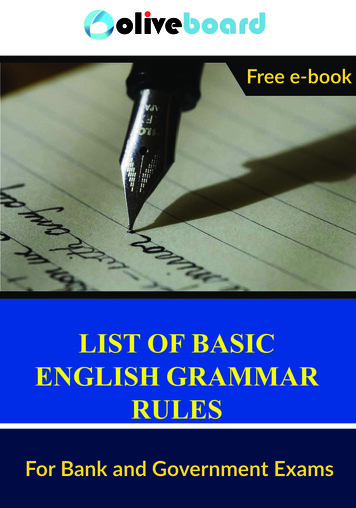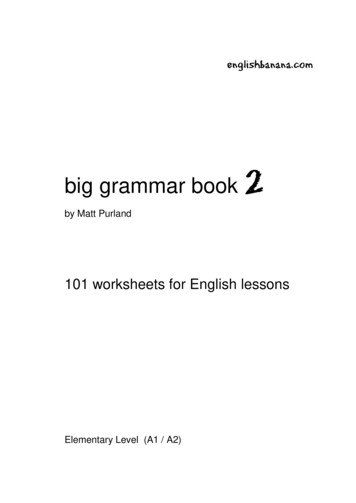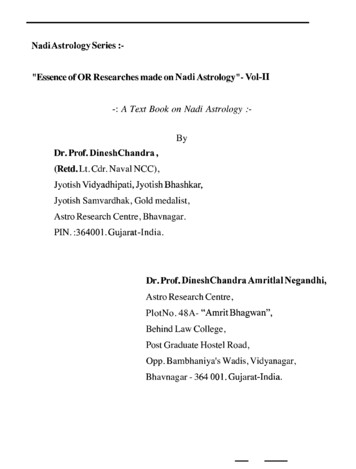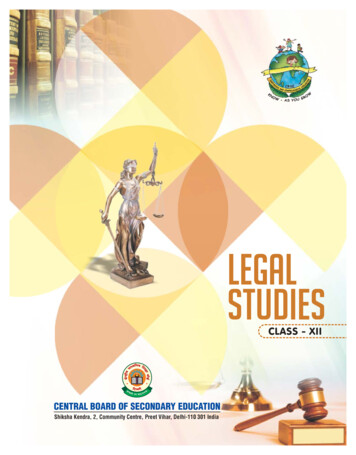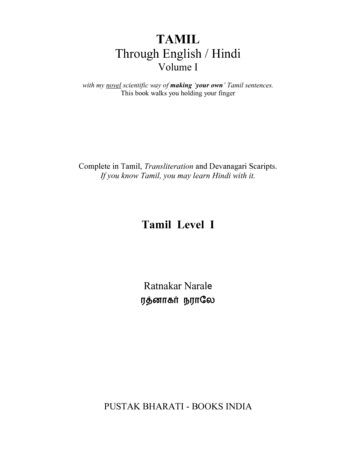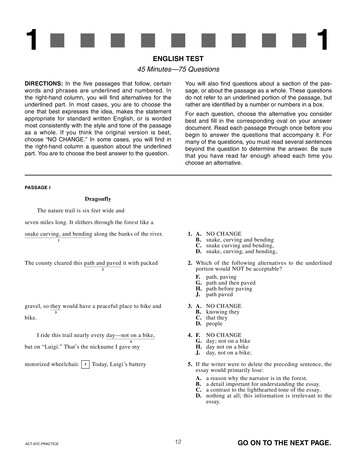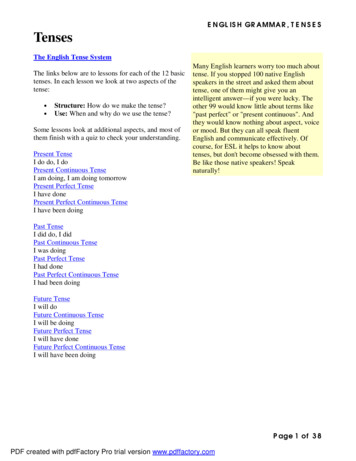![English Text Book[1] - Weebly](/img/4/comprehension-and-communication-skills-in-english-engl101.jpg)
Transcription
COMPREHENSION AND COMMUNICATION SKILLS IN ENGLISHCOURSE NO. ENGL-101A TEXT BOOK FOR THE STUDENTS OF FIRST YEAR B. Sc (Ag.)NAME- AMIT NAGARDEPARTMENT OF ENGLISHCOLLEGE OF AGRICULTUREACHARYA N.G. RANGA AGRICULTURAL UNIVERSITYRAJENDRANAGA, HYDERABAD – 500 030.
COMPREHENSION AND COMMUNICATION SKILLS INENGLISHA TEXT BOOK FOR THE COURSE NO. ENGL. 101 (NEW)DEPARTMENT OF ENGLISHByDr. G. Shravan KumarAssociate Professor & University HeadMs. S.M. PadmasriAssistant ProfessorMr. P. Ramesh BabuAssistant Professor2
PrefaceIn the era of globalization, communication plays a vital role in the smoothfunctioning of any organization; hence the need to impart communication skills toundergraduate student assumed greate r importance.This Text Book has been designed under different units to improve standards inperforming the communicative tasks. Précis writing, Business Correspondence, ReportWriting are major forms of written communication in the professional world where as thechapters on Verbal Ability, Functional Grammar and Usage are intended to help thestudent to take care of the mechanics of writing, which enhance the effectiveness ofwritten communication. To impart oral communication skills chapters on Seminars,Conferences, Group Discussion, Meetings, Interviews, Telephonic Conversations Etc.,are included.I hope finally the exercises at the end of chapter will serve a useful purpose indeveloping the spoken English and the communicative skills of professional students, inview of all the scientific and technical advancement of the universe is being documentedin English only.I appreciate the sincere efforts of the authors in bringing out this Text book.Rajendranagar,Hyderabad.Dr. T. Yellamanda ReddyDean of Agriculture3
LECTURE OUTLINES1.2.Course No.Course titles::3.4.Credit hoursGeneral objective::5.ENGL 101COMREHENSION AND COMMUNICATIONSKILLS IN ENGLISH2 (1 1)To develop the comprehension and communicationskills of I year B.Sc (Ag.) Students in EnglishSpecific Objectivesa) TheoryBy the end of the course the B.Sc (Ag) students will be able toi)understand the basic concepts of comprehensionii)understand the fundame ntals of grammariii)enhance their vocabularyiv)improve their skills in written communicationb) PracticalBy the end of the course, the B.Sc. (Ag) students will be able toi)have a clear concept of communication skills in English by using AV aids inspoken Englishii)improve their reading skillsiii)present the reports orally and participate in debates and Groups DiscussionsA) Theory Lecture Outlines1.War Minus Shooting, A lesson from the Text Book, “The Sporting Spirit” byGeorge Orwell. Comprehension pertaining to the Textual Grammar i.e., Fillin the blanks, Matching and vocabulary2.War Minus Shooting, A lesson from Text Book, “The Sporting Spirit”Reading Comprehension and answering the questions related to the text3.Synonyms, List of synonyms, Choose the correct synonyms, exercises –practice and implementationAntonyms, fill in the blanks, choose the correct Antonyms, exercisesPractice and Implementation4.Verbal Ability, A list of Words often confused and misused – Practice andImplementation5.A Dilemma – A lesson from the Text Book, Layman looks at Science byRaymond Fosdick Comprehension pertaining to the Textual Grammar i.e.,Fill in the blanks, Matching, Vocabulary and Reading Comprehension6.A Dilemma – A layman looks at Science, Reading Comprehension andanswering the questions4
7.Homonyms, Homonyms are distinct words with quite different meaningsuse the following words in two ways , more words at a glance and exercisesrelated to GRE & TOEFL8.Homophones, A list of homophones, Fill in the blanks, Underline thecorrect word and exercises related to GRE & TOEFL9.You and Your English, A lesson from the Text Book, Spoken English andBroken English by G.B. Shaw, answering the questions related to the Text.Fill in the blanks, Matching, Vocabulary and Reading Comprehension10.You and Your English, Reading Comprehension and answering thequestions11.Functional Grammar, Tenses, Active voice and Passive voice, Direct andIndirect speech and Agreement of verb with subject12.Functional Grammar, Articles, Prepositions, Parts of Speech andAgreement of verb with subject13.Business correspondence, Principles of letter writing, Courtesy andConsideration, Directness and Conciseness, Avoid Verbosity and participialEndings, Clarity and Precision, Negative and round about, Structure andlayout of letters , Planning a letter, Quotations, Orders, Tenders, Salesletters, Claim and Adjustment Letters, Job application letters, Socialcorrespondence Personal Correspondence and CV14.The Style, Importance of Professional Writing, Choice of words andphrases , Cliches, Jargons, Foreign words and phrases15.Precis Writing, Summarizing, The essential features of a good précis,Important points while making a précis, Some Don’ ts, Make a précis of thefollowing paragraph and suggest suitable title. Figurative language16.Interview,The Screening Interview, The informational Interview, TheDirective Style, The Meandering Style, The Stress Interview, TheBehavioural Interview, The Audition, The Tag-Team Interview, TheMealtime Interview, The Follow -up Interview, Fermi Interview, Preparingfor the Interview, Body Language and Interview, Types of InterviewsQuestions. Idiomatic language5
B) Practical Class Outlines1.Effective L istening – Developing Listening Skills – Honing Listening skills2.Listening to Short talks and Lectures from the cassettes of EFL University3.Spoken English, Vowels, consonants, monophthongs, diphtongs, triphthongs4.Stress, intonation, phonetic tra nscription5.Seminars, Conferences, preparation and demonstration6.Oral Presentation by students, Articulation and delivery – Evaluation sheetfor oral presentation7.Communication skills – Verbal communication, written communication8.Telephonic conversation9.Reading Skills, Skimming, Scanning, Extensive reading, Intensive readingexamples10.Meeting, purpose, procedure, participation, physical arrangements11.Presentation of reports by using power point & L.C.D12.Interviews – Mock interviews13.Debate and Group discussion14.Using a dictionary effectively15.Vocabulary16.Pronunciation practiceReferencesBalasubramanian T. 1989. A Text book of Phonetics for Indian Students, OrientLongman , New DelhiBalasubrmanyam M. 1985. Business Communication, Vani Educational Books, NewDelhiJean Naterop, B. and Rod Revell 1997. Telephoning in English Cambridge UniversityPress, CambridgeKrishna Mohan and Meera Banerjee 1990. Developing Communication Skills,Macmillan India Ltd. New Delhi.Krishnaswamy,. N and Sriraman, T. 1995. Current English for Colleges, MacmillanIndia Ltd. MadressNarayanaswamy V R 1979. Strengthen your writing, Orient Longman, New DelhiSharma R C and Krishna Mohan 1978. Business Correspondence, Tata Mc Graw Hillpublishing Company, New Delhi6
ctivelectureInteractivelectureTeaching aidreferenceChalk Board &Tape RecorderChalk Board &Tape activelectureHand writtenTransparencyTypedTransparencyPublic addresssystem2,51 hrInteractivelectureChalk Board &Public addresssystem1Chalk Boar d &StripTransparencyChalk Board &StripTransparencyChalk Board &Public addresssystemChalk Board &Public addresssystemChalk Board &PullTransparencyChalk Board &1 Single flapdoubleprojectionTransparencyChalk Board2,51 hr4.War Minus ShootingComprehensionWar Minus Shooting,ReadingComprehens ionSynonyms, Antonyms5.Words often confused1 hr6.A Dilemma – Alayman looks atScience readingComprehensionA Dilemma – Alayman looks atScience ReadingComprehensionHomonyms, GRE &TOEFEL exercise1 hr1 hrInteractivelectureHomophones1 hrInteractivelecture10. You and Your English,ReadingComprehension11. You and Your English,ReadingComprehensio n12. Functional GrammarAgreement of verbwith subject13. Functional GrammarAgreement of verbwith subject1 hrInteractivelecture1 hrInteractivelecture1 hrInteractivelecture1 hrInteractivelecture14. Businesscorrespondence,PersonalCorrespondence, CV1 hrInteractivelecture3.7.8.9.1 hr1 hr712,512,5112,52,53
15. Style in Report Writing1 hrInteractivelecture16. Precis Writing,Figurative language1 hrInteractivelecture17. Interviews, Idiomaticlanguage1 . Listening to shorttalks and lectures18. Spoken English,Stress andintonationTime2 hr 30 mts2 hr 30 mts19. Seminars andConferences2 hr 30 mts20. Seminars andConferences21. Oral Presentationby students22. Evaluation of oralpresentation2 hr 30 mts23. Types ofCommunicationFace to face24. Types ofCommunicationTelephonicconversation25. Reading Skills2 hr 30 mts26. Meetings, Purpose,procedure,Participation2 hr 30 mts27. Meetings,Chairmanship,Phys ical2 hr 30 mts2 hr 30 mts2 hr 30 mts2 hr 30 mts2 hr 30 mtsTeachingmethodPractice inlisteningListening toSpokenEnglishCassettesInteractivelectureChalk Boardand Publicaddress systemChalk Boardand WindowTransparencyPublic Addresssystem2,5Teaching aidReferenceTape Recorder7Tape Recorder4Chalk Board& PublicAddresssystemDemonstration Public addresssystemInteractiveChalk boardlectureInteractiveChalk Boardlecture& TapeRecorderInteractiveChalk Boardslecture, Role& TapepalyRecorderInteractiveChalk Boardlecture, Role& TapeplayRecorderInteractivelecture mChalk BoardInteractivelecture &demonstrationPublic address862,52,52,52,52,56,76,72,5,62,52,5
arrangements etc28. Presentation ofreports by usingpower point andLCD29. Interviews2 hr 30 mtsDemonstration LCD projector2,52 hr 30 mtsInteractivelecturePractice ofMockinterviewsInteractive &Role playPublic addresssystemPublic addresssystem2,5Public addresssystem &Chalk BoardChalk Board2,5,630. interviews2 hr 30 mts31. Group Discussion& Debates2 hr 30 mts32. Using DictionaryReading Dialogue2 hr 30 mtsInteractive &Role play andDictionary92,5
CONTENTSTHEORY1.PagesWar Minus shootingText1- 3George Orwell2.War Minus shooting4- 9Comprehension and Notes3.Synonyms, Antonyms10 – 154.Verbal Ability16 - 18Words often confused and misused5.A DilemmaText19 - 21Raymond Fosdick6.Dilemma22 - 24Comprehension and Notes7.Homonyms258.Homophones26 - 279.You and Your EnglishText28 - 30G.B. Shaw10.You and Your English31 - 35Comprehension and Notes11.Functional Grammar36 – 3810
12.Functional Grammar Exercises39 – 4113.Business Correspondence42 - 5114.The style52 - 5415.Précis writing55 - 5816.Interviews59 – 66PRACTICALS1.Effective listening68 - 692.Listening to short talks3.Introduction to Spoken English71 - 754.Stress and intonation76 - 785.Seminars and conferences79 - 826.Oral presentation83 - 877.Communication skills88 - 898.Telephonic conversion90 - 949.Reading skills95 – 9910.Meetings70100 - 10211
11.Presentation of reports by using Power point103 - 107L.C.D12.Interviews10713.Group Discussion108 - 10914How to use a dictionary well110 - 11315.Vocabulary114 - 11816.Pronunciation practice119 - 12112
1. WAR MINUS SHOOTINGThe Sporting SpiritGeorge OrwellGeorge Orwell (1903-1950), who was born in Bengal and educated in England, iswell known for his greatest novel, Animal Farm, a masterly political satire on the Russianrevolution. His last work. Nineteen Eighty-four, is a grim forecast of the future oftotalitarianism, written in the form of a readable novel.The Sporting Spirit first appeared in the Tribune, in December 1945 and is arefreshingly frank expression of Orwell’s views on competitive games. You may or maynot agree with his views but the essay is certainly worth reading and talking about.I am always amazed when I hear people saying that sport creates goodwillbetween the nations, and that if only the common peoples of the world could meet oneanother at football or cricket, they would have no inclination to meet one another atfootball or cricket, they would have no inclination to meet on the battlefield. Even if onedidn’t know from concrete examples (the 1936 Olympic Games, for instance) thatinternational sporting contests lead to orgies of hatred, one could deduce it form generalprinciples.Nearly all the sports practised nowadays are competitive. You play to win, and thegame has little meaning unless you do your utmost to win. On the village green, whereyou pick up sides and no feeling of local patriotism is involved, it is possible to playsimply for the fun and exercise: but as soon as the question of prestige arises, as soon asyou feel that you and some larger unit will be disgraced if you lose, the most savagecombative instincts are aroused. Anyone who has played even in a school football matchknows this. At the international level sport is frankly mimic warfare. But the significantthing is not the behavior of the player but the attitude of the spectators: and, behind thespectators, of the nations who work themselves into furies over these absurd contests, andseriously believe-at any rate for short periods-that running, jumping and kicking a ball aretests of natio nal virtue.13
Even a leisurely game like cricket, demanding grace rather than strength, cancause much ill-will, as we saw in the controversy over body-line bowling and over therough tactics of the Australian team that visited England in 1921. Football, a game inwhich everyone gets hurt and every nation has its own style of play which seems unfair toforeigners, is far worse. Worst of all is boxing. One of the most horrible sights in theworld is a flight between white and coloured boxers before a mixed audience. But aboxing audience is always disgusting, and the behavior of the women, in particular, issuch that the army, I believe, does not allow them to attend its contests. At any rate, twoor three years ago, when Home Guards and regular troops were holding a boxingtournament, I was placed on guard at the door of the hall, w ith orders to keep the womenout.In England, the obsession with sport is bad enough, but even fiercer passions arearoused in
ENGL-101 A TEXT BOOK FOR THE STUDENTS OF FIRST YEAR B. Sc (Ag.) . use the following words in two ways, more words at a glance and exercises related to GRE & TOEFL 8. Homophones, A list of homophones, Fill in the blanks,Underline the correct word and exercises related to GRE & TOEFL 9. You and Your English, A lesson from the Text Book, Spoken English and Broken English by G.B.

